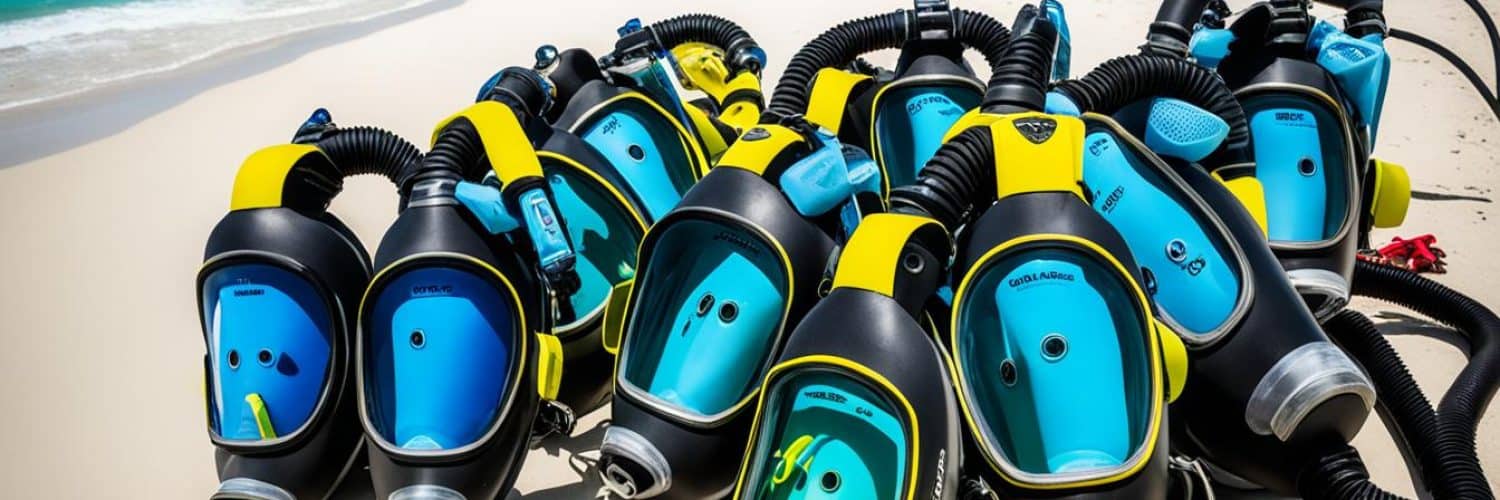Are you planning to embark on an exciting scuba diving adventure? Before you take the plunge, it’s essential to acquire the necessary scuba certification. To help you succeed in your scuba certification journey, we have compiled a list of the best travel scuba certification study guides available. These study guides will provide you with the knowledge and skills required to become a confident and competent diver.
Key Takeaways:
- Choosing the right scuba certification study guide is crucial for your success in becoming a certified diver.
- Consider reputable organizations like PADI, SSI, NAUI, BSAC, and SDI when selecting your study materials.
- Ensure the study guide aligns with your learning style and preferences.
- Research and read reviews to find the best scuba study guide for your needs.
- Investing in a comprehensive and up-to-date study guide will enhance your understanding and prepare you for the challenges of scuba diving.
Runner-Up, Best Overall: SSI
When it comes to scuba certification, Scuba Schools International (SSI) is a top contender. As the second-largest scuba training agency in the world, SSI boasts over 3,500 dive centers spanning across more than 150 countries. With such a wide reach, you can easily find an SSI-certified dive center near your location.
One of the standout features of SSI is its commitment to providing a personalized and tailored learning experience. SSI offers certification courses in multiple languages, both online and in traditional classroom settings, ensuring accessibility for all enthusiasts. With their emphasis on practical training in confined and open water, SSI ensures that you receive hands-on experience and individualized instruction.
But SSI’s offerings extend beyond the basic certification course. They provide a range of advanced courses and specialties, catering to divers looking to dive deeper into the world of scuba. From technical diving to lifeguard training, mermaid training to freediving and snorkeling options, SSI has something for everyone. This makes them a go-to choice for divers seeking further education and specialization.
Moreover, SSI instructors benefit from access to a network of career opportunities within the organization. By joining SSI as an instructor, you open doors to a range of exciting job prospects in the scuba diving industry.
With its global presence, personalized approach, and extensive range of courses, Scuba Schools International (SSI) is truly a deserving runner-up in our search for the best scuba certification provider.
Take a look at the table below to see a quick comparison between SSI and other top scuba certification agencies:
| Scuba Schools International (SSI) | Other Agencies | |
|---|---|---|
| Number of Dive Centers Worldwide | Over 3,500 | Varies |
| Available Languages | Multiple | Varies |
| Course Options |
|
Varies |
| Career Opportunities for Instructors | Extensive network | Varies |
As the table above shows, Scuba Schools International (SSI) stands out with its extensive global reach, diverse course options, and career opportunities for instructors.
Oldest Agency: NAUI
The National Association of Underwater Instructors (NAUI) is the oldest civilian diver training agency, founded in the 1950s. NAUI’s training programs focus on safety, training a few divers well rather than many divers with marginal skills. Their certifications are recognized worldwide, and their instructors have the freedom to adapt teaching methods to suit individual students.
NAUI offers a range of recreational, technical, and professional courses, with a particular focus on safety awareness. While they have fewer dive centers worldwide compared to other organizations, they are highly respected in the diving community.
Here is a detailed comparison of NAUI’s recreational and technical courses:
| Course | Description |
|---|---|
| Open Water Diver | The beginning scuba course that provides the knowledge and skills to become a certified diver. |
| Advanced Scuba Diver | Builds upon the skills learned in the Open Water course and introduces new diving techniques and environments. |
| Rescue Scuba Diver | Develops rescue skills and the ability to assist other divers in emergency situations. |
| Master Scuba Diver | The highest level of recreational scuba diving, demonstrating a high level of skill and experience. |
| Technical Diver | Provides training for more advanced diving techniques, including decompression dives and the use of mixed gases. |
NAUI’s commitment to safety and comprehensive training make them a reliable choice for divers seeking the best scuba diving study materials and scuba certification study guides reviews.
Best British Contingent: BSAC
When it comes to scuba diving and snorkeling in the United Kingdom, the British Sub-Aqua Club (BSAC) stands out as the national governing body. With a reputation for providing high-quality training, BSAC certifications are widely respected, especially due to the challenging diving conditions in the UK.
BSAC offers a range of courses suitable for all levels of divers. From the entry-level Ocean Diver certification, which introduces beginners to the wonders of the underwater world, to technical and professional qualifications for those seeking advanced training and expertise. BSAC courses are designed to equip divers with the necessary skills to support club diving and encourage a vibrant dive club lifestyle.
BSAC also offers a variety of social events, dive trips, and overseas expeditions, providing opportunities for divers to explore new dive sites and connect with fellow enthusiasts.
Benefits of Choosing BSAC for Scuba Certification
- Extensive course offerings for divers of all levels
- High-quality training and certifications recognized in the diving community
- Focus on challenging diving conditions, preparing divers for various environments
- Promotion of a dive club lifestyle with social events, dive trips, and expeditions
To get a glimpse of the beauty that awaits underwater, take a look at this stunning image:
With its commitment to providing comprehensive training and fostering a vibrant diving community, BSAC is a top choice for individuals seeking scuba certification in the United Kingdom.
Best for Future Tec Divers: SDI
For divers interested in future technical diving, Scuba Diving International (SDI) is the top choice. SDI is part of International Training, a renowned group of diving organizations that includes Technical Diving International (TDI), the world’s largest technical training agency.
SDI’s entry-level Open Water Scuba Diver course is a comprehensive program that combines theoretical e-learning, pool sessions, and open water dives. This structured approach ensures divers gain the necessary knowledge and skills to excel in their diving journey.
With SDI, divers have access to a range of specialty courses that cater to their interests and goals. Whether it’s deep diving, wreck diving, or underwater photography, SDI offers programs to enhance divers’ expertise in specific areas.
SDI also offers diving programs for children, allowing young adventurers to explore the underwater world and develop their passion for scuba diving from an early age.
With training centers in more than 100 countries, divers can easily find an SDI facility near their preferred dive destination. Additionally, SDI instructors have access to job listings and further opportunities in specialist diving, making it an excellent choice for those aiming to pursue a career in the diving industry.
If you’re looking for the best scuba study guide to complement your SDI certification course, consider exploring the diverse range of resources available. From comprehensive textbooks to interactive online materials, finding the right study guide can greatly enhance your understanding and preparation for the scuba certification exam.
Other Scuba Certification Organizations
While the aforementioned organizations are among the top choices for scuba certification, there are also other reputable scuba certification organizations to consider. These include the Confédération Mondiale des Activités Subaquatiques (CMAS), Scuba Schools International (SSI), and Scuba Diving International (SDI).
Confédération Mondiale des Activités Subaquatiques (CMAS)
The Confédération Mondiale des Activités Subaquatiques (CMAS) was founded in 1959 and has a presence in over 130 countries. CMAS offers a comprehensive range of scuba diving certifications, from beginner to advanced levels. Their courses focus on safety, skill development, and environmental awareness. CMAS certifications are recognized worldwide, providing divers with opportunities to explore dive sites globally.
Scuba Schools International (SSI)
Scuba Schools International (SSI) is known for its flexible and performance-based learning approach. They offer a variety of scuba certification courses for both recreational and technical diving. SSI’s certifications are recognized globally, and their instructors prioritize personalized instruction and practical training. Whether you’re a beginner or an experienced diver, SSI provides comprehensive resources and support to enhance your diving skills.
Scuba Diving International (SDI)
Scuba Diving International (SDI) is a leading organization that offers a range of courses for both recreational and technical diving. As part of International Training, SDI provides divers with access to world-class training materials and an extensive network of dive centers. SDI’s certifications are recognized globally, and their courses are designed to meet the needs of divers at all levels. Whether you’re interested in exploring wrecks, caves, or deep-water environments, SDI has the resources and expertise to support your diving aspirations.
Each scuba certification organization mentioned above has its own unique teaching methods, course offerings, and certification structures. It’s important to research and choose the organization that best aligns with your needs, interests, and learning style. Explore their websites, read reviews, and reach out to certified divers for recommendations to make an informed decision. Regardless of the organization you choose, obtaining a scuba certification will open up a world of underwater adventure and exploration.
Finding the Best Scuba Study Guide
When preparing for a scuba certification course, it’s important to have reliable study materials that can enhance your understanding of the material. A good scuba study guide can provide you with the necessary knowledge and help you feel confident in your skills and abilities. Here are some tips to help you find the best scuba study guide for your needs:
- Choose up-to-date materials: Look for study guides that are current and aligned with the most recent standards and guidelines in scuba diving. This ensures that the information you learn is accurate and relevant.
- Seek comprehensive resources: A good study guide should cover all the essential topics and concepts required for your scuba certification. Look for guides that provide a thorough overview of diving theory, safety procedures, equipment usage, and emergency protocols.
- Consider user reviews and recommendations: Reading reviews and seeking recommendations from certified divers can help you gauge the quality and effectiveness of different study guides. Look for guides that have positive feedback, indicating that they have been helpful to other divers.
- Assess clarity and organization: Look for study guides that present information in a clear and concise manner. The content should be well-organized, making it easier for you to navigate through the material and retain key concepts.
- Align with your certification program: Different scuba certification programs may have specific study material requirements. Ensure that the study guide you choose is tailored to your specific program and covers all the necessary topics and skills required for certification.
By considering these factors, you can find a high-quality scuba study guide that best suits your learning style and needs. Remember, a well-prepared diver is a confident and safe diver.
| Study Guide | Features | User Rating |
|---|---|---|
| Scuba Study Guide 101 | Comprehensive coverage of scuba theory, practical exercises, and safety procedures. | 4.5/5 |
| Mastering Scuba Diving | Interactive online platform with videos, quizzes, and practice exams. | 4.2/5 |
| Pro Diver’s Companion | Detailed guidebook with in-depth explanations and real-life diving scenarios. | 4.6/5 |
| Scuba Explorer’s Handbook | Practical guide focusing on dive planning, underwater navigation, and marine life identification. | 4.4/5 |
Remember, finding the best scuba study guide is an essential step in your scuba certification journey. Invest in reliable and comprehensive materials to ensure a successful learning experience.
The Importance of Scuba Certification
Scuba certification is vital for anyone who wants to explore the underwater world safely and responsibly. When you become certified, you gain the knowledge and skills necessary to ensure your own safety and the safety of others while diving. Here are some reasons why scuba certification is important:
- Safety: Scuba certification courses cover essential topics such as dive planning, equipment selection and maintenance, and emergency procedures. These skills are crucial for safe diving practices and can help you navigate potential risks.
- Access to Dive Operators and Resorts: Many dive operators and resorts require proof of scuba certification before allowing divers to participate in their programs. Having a certification opens up opportunities to explore dive sites and resorts around the world.
- Global Recognition: Scuba certification is recognized and respected worldwide. It provides proof of your training and qualifications, allowing you to dive in different locations with confidence.
- Enhanced Diving Experiences: Being certified opens the door to a wide range of diving experiences. Many dive sites and dive operators only allow certified divers, offering unique underwater environments and marine life encounters.
By obtaining scuba certification, you not only ensure your safety but also gain access to incredible diving opportunities and experiences. It’s a worthwhile investment that will enhance your overall enjoyment of the underwater world.
Recommended Scuba Diving Destinations
Once you’ve obtained your scuba certification, you’ll be able to explore a whole new world underwater. There are numerous scuba diving destinations around the world that offer breathtaking underwater landscapes and diverse marine life. Some recommended destinations for both beginners and seasoned divers include:
- Bonaire in the Caribbean: Known for its protected marine resources and abundant fish species.
- The Maldives: With stunning white sand beaches and excellent reefs.
- Belize: Home to the longest unbroken barrier reef in the Western Hemisphere.
- The Canary Islands: Offering warm, clear waters and the opportunity to spot species such as angel sharks and rays.
Each destination offers unique diving experiences and is worth exploring.
| Destination | Features |
|---|---|
| Bonaire | Protected marine resources, abundant fish species |
| The Maldives | White sand beaches, excellent reefs |
| Belize | Longest barrier reef in the Western Hemisphere |
| The Canary Islands | Warm, clear waters, angel sharks, rays |
Tips for Choosing a Scuba Certification Course
When embarking on your scuba diving journey, choosing the right scuba certification course is crucial. Here are some valuable tips to consider:
- Research the diving organization: Ensure that the organization offering the certification has a good reputation and credibility within the diving community. Look for organizations with experienced instructors, comprehensive training programs, and positive reviews from past students.
- Evaluate the cost and inclusions: Consider the cost of the course and what it includes. Some courses may cover equipment rental and certification fees, while others may require additional expenses. It’s important to understand the overall investment required.
- Assess the location and facilities: Evaluate the location of the dive center and its proximity to dive sites. Choose a center that offers easy access to diverse and exciting diving environments. Also, consider the facilities available, such as well-maintained gear, classrooms, and practice areas.
- Consider teaching methods and opportunities for specialization: Investigate the teaching methods and style of the instructor. Some individuals may prefer a certain teaching approach or have specific learning needs. Additionally, check if the dive center offers opportunities for further education and specialization after obtaining the initial certification.
“Choosing the right scuba certification course is crucial to your diving journey. Ensure you research the diving organization, evaluate the cost and inclusions, assess the location and facilities, and consider teaching methods and opportunities for specialization.”
By taking these factors into account, you can make an informed decision and select a scuba certification course that best aligns with your goals, preferences, and learning style.
| Factors to Consider | Key Points |
|---|---|
| Research the diving organization | Experienced instructors Comprehensive training programs Positive reviews |
| Evaluate the cost and inclusions | Consider overall investment Understanding of additional expenses |
| Assess the location and facilities | Proximity to dive sites Quality of gear and facilities |
| Consider teaching methods and opportunities for specialization | Teaching style and approach Further education and specialization options |
Conclusion
Obtaining a scuba certification is an important milestone in your journey to explore the underwater world. To become a confident and skilled diver, it is crucial to have the best scuba diving study materials, travel-friendly scuba certification guides, and proper training. Whether you choose PADI, SSI, NAUI, BSAC, SDI, or another reputable organization, make sure the certification program aligns with your goals, preferences, and learning style.
Remember to prioritize safety above all else, both during your certification course and in all future dives. Continuously expanding your knowledge and skills through further educational courses will enhance your diving abilities and allow you to explore more exciting underwater destinations. Opportunities for adventure and exploration are endless in the underwater world, so dive in and enjoy the wonders that await you.
With the right scuba certification and a passion for underwater exploration, you can embark on unforgettable journeys, discover breathtaking marine landscapes, and witness incredible marine life in its natural habitat. So, gear up, dive deep, and create lifelong memories as you explore the fascinating world beneath the waves.
FAQ
What is the PADI certification?
How many certifications has PADI issued?
PADI has issued over 29 million scuba diving certifications since its founding in 1966.
What is Scuba Schools International (SSI)?
Scuba Schools International (SSI) is the second-largest scuba training agency in the world, with over 3,500 dive centers in more than 150 countries.
What does SSI offer in terms of scuba certification?
SSI offers a range of scuba certification courses, including online and traditional classroom-based options. They also provide advanced courses and specialty programs, such as technical diving, lifeguard training, and mermaid training.
What is the National Association of Underwater Instructors (NAUI)?
The National Association of Underwater Instructors (NAUI) is the oldest civilian diver training agency, founded in the 1950s.
What is NAUI known for in terms of scuba certification?
NAUI is known for its focus on safety and training a few divers well. Their certifications are highly respected worldwide, and their instructors have the freedom to adapt teaching methods to suit individual students.
What is the British Sub-Aqua Club (BSAC)?
The British Sub-Aqua Club (BSAC) is the national governing body for scuba diving and snorkeling in the United Kingdom.
What does BSAC offer in terms of scuba certification?
BSAC offers a range of scuba certification courses, from entry-level to technical and professional qualifications. They focus on high-quality training and promote a club lifestyle with social events and dive trips.
What is Scuba Diving International (SDI)?
Scuba Diving International (SDI) is a top choice for divers interested in future technical diving. They are part of International Training, a group of diving organizations that includes Technical Diving International (TDI).
What does SDI offer in terms of scuba certification?
SDI offers a range of scuba certification courses, including their entry-level Open Water Scuba Diver course. They also offer specialty courses and programs for children.
Are there other reputable scuba certification organizations?
Yes, other reputable scuba certification organizations include Confédération Mondiale des Activités Subaquatiques (CMAS) and Scuba Schools International (SSI). Each organization has its own unique teaching methods and certifications.
What are some factors to consider when choosing a scuba certification course?
When choosing a scuba certification course, it’s important to consider the reputation and credibility of the diving organization, the cost of the course and what it includes, the location and facilities of the dive center, and the teaching method and style of the instructor.
Why is scuba certification important?
Scuba certification is important because it ensures your safety and the safety of others while diving. It also opens up opportunities for diving excursions and experiences around the world, as many dive sites and operators require proof of certification. Additionally, scuba certification provides knowledge and skills that enhance your overall diving experience.
What are some recommended scuba diving destinations?
Some recommended scuba diving destinations include Bonaire in the Caribbean, the Maldives, Belize, and the Canary Islands. Each destination offers unique diving experiences and stunning underwater landscapes.
How can I find the best scuba study guide?
To find the best scuba study guide, it’s helpful to read reviews and seek recommendations from certified divers. Consider factors such as clarity of information, organization of content, and relevance to the certification program you’ll be undertaking.







Add comment